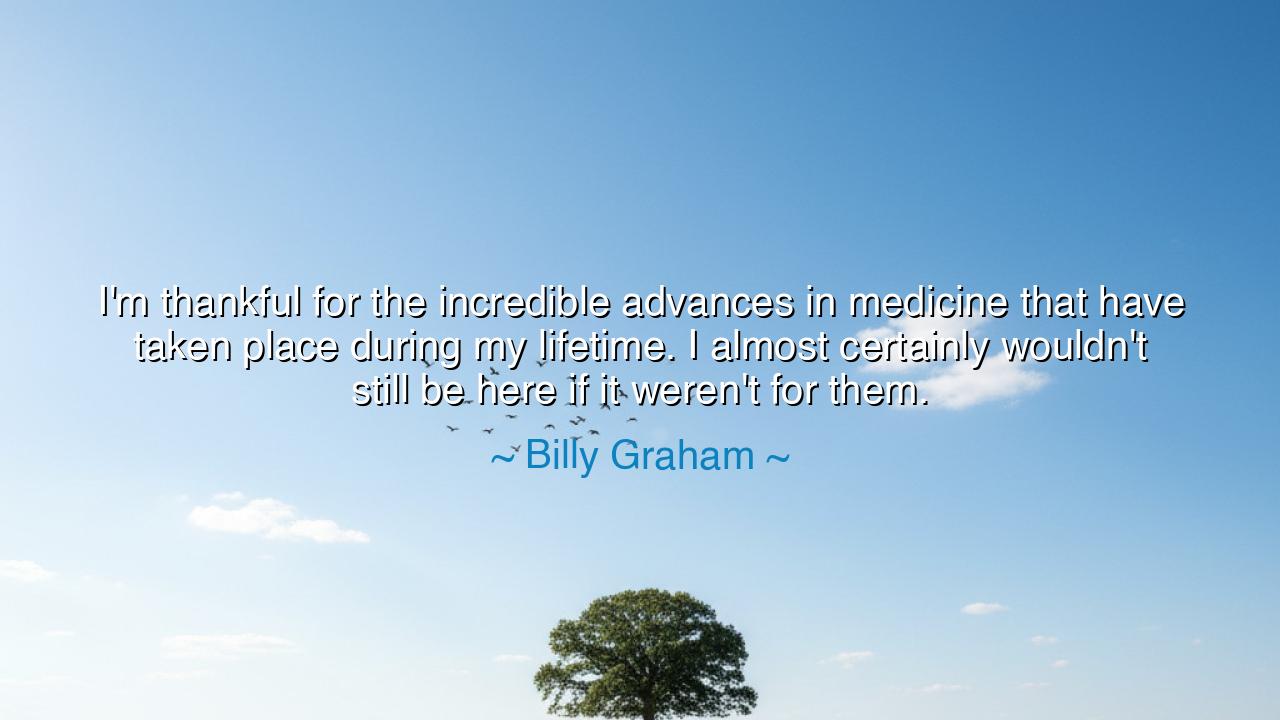
I'm thankful for the incredible advances in medicine that have
I'm thankful for the incredible advances in medicine that have taken place during my lifetime. I almost certainly wouldn't still be here if it weren't for them.






The words of Billy Graham, “I’m thankful for the incredible advances in medicine that have taken place during my lifetime. I almost certainly wouldn’t still be here if it weren’t for them,” are not simply the reflections of an elder looking back upon his years, but the testimony of one who sees divine providence at work through human hands. In these words, there is both humility and reverence — humility in recognizing his own frailty, and reverence for the advances in medicine that prolonged his days upon the earth. He speaks not as one who takes life for granted, but as one who knows he has been preserved by blessings beyond his own strength.
To say he is thankful is to acknowledge the miracle that progress itself is a gift. The ancients often attributed healing only to the touch of the gods or the prayers of priests. Yet as centuries passed, knowledge grew, and with it came cures, treatments, and discoveries that saved countless lives. Graham’s gratitude is not only for his personal survival, but for the generations spared from suffering because of the sacrifices of healers, physicians, and scientists who devoted their lives to the pursuit of health. His words remind us that gratitude must not only look to heaven but also honor the earthly laborers through whom heaven works.
History itself provides a vivid example. In the early 20th century, penicillin was discovered by Alexander Fleming, and with it began a new era of medicine. Countless millions who would have perished from infections were suddenly saved. Soldiers wounded in battle, children struck with fevers, families torn by disease — all were delivered because of this advance. Before this, even small wounds could become fatal. Graham’s statement echoes this truth: had he been born in an earlier age, before such breakthroughs, his life — like so many others — might have been cut short. Thus his gratitude is not only personal, but universal.
The heart of the quote also carries a spiritual weight. To say, “I wouldn’t still be here if it weren’t for them,” is to confess the fragility of human life. It is an acknowledgment that strength fades, bodies fail, and no person is immortal. Yet within that frailty lies a call to live with purpose. The ancients taught this as well. Socrates, standing before his accusers, declared that death was not to be feared, for it was part of the natural order. But while life remains, it must be lived with integrity. Graham’s words echo this wisdom — that the days preserved by medicine are not to be squandered, but used with gratitude and meaning.
At the same time, his words uplift the role of the healers themselves. For doctors, nurses, and scientists are often unsung heroes, laboring quietly while others claim glory. Their work saves lives not through conquest or spectacle, but through patience, study, and compassion. Just as the ancients honored their physicians — Hippocrates in Greece, Hua Tuo in China, and Sushruta in India — so too must we give thanks today for those who continue that legacy. Graham’s voice, filled with reverence, is a reminder to honor them, for through their craft flows the mercy of God.
The lesson for us, then, is both simple and profound: never take your life for granted. Give thanks for the knowledge and sacrifice that has preserved you. Recognize the fragility of your days, and let that recognition stir you to live with gratitude and purpose. Do not forget that the comfort you enjoy, the years you are given, are gifts born of struggle, discovery, and sacrifice by countless others. Gratitude, in this sense, is not a mere feeling, but a duty — to honor the gift by living it fully.
As practical action, begin each day by remembering the miracle that you are alive. Offer thanks for your health, however imperfect, and for the advances that preserve it. Honor the healers around you — thank your doctors, support medical work, and cherish those who care for the sick. And above all, use your borrowed days well. Serve others, love deeply, live meaningfully. In doing so, you transform gratitude into legacy, just as Graham himself sought to do.
Thus, the words of Billy Graham endure as a timeless reminder: be thankful for the blessings of life preserved, for medicine is a gift, and every breath is grace. We stand today because others labored to heal, and because of this, our duty is clear — to live each day not in arrogance, but in gratitude, humility, and purpose.






AAdministratorAdministrator
Welcome, honored guests. Please leave a comment, we will respond soon